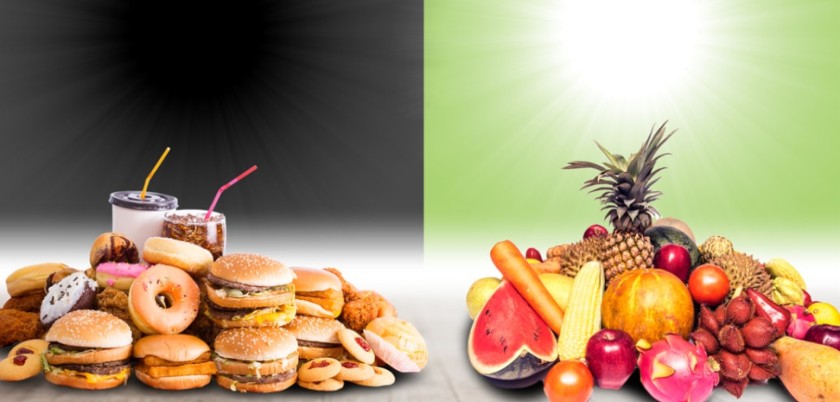
Keep the spirit of ‘good over evil’ alive this Dussehra by some healthy swaps
Making healthier food and lifestyle choices should be your goal this Dussehra. Burn the ‘Raavan’ of evil foods this Dussehra by the Ram ji’s arrow of healthy foods. This list of “This for That” will give your mind a plenty of room to rethink your food choices.
Napping or energy drink?
Tired of the exhaustive 9-5 job. What next? Back home, what’s the first thing you prefer- napping or having some energy drink? These energy drinks are just add-ons to your daily calories consumed. Research has proven napping to be beneficial over anything else when exhausted. It boosts the productivity and also makes a person more alert. Napping a few minutes relieves stress too! Napping gives a burst of energy, which even the energy drinks can’t give you.
Nuts or nut butter?
Having a handful of nuts is a healthy snack option. They give a feeling of satiety. On the contrary, nut butters (almond butter, peanut butter etc.) are loaded with fat, sugar and salt. They also have added preservatives. Some even contain partially hydrogenated oils that are a source of unhealthy trans fat. Moreover, we don’t know when it’s just enough! The palatability of nut butters induce cravings in us that further causes its consumption beyond limits.
Stopping when full or eating till plate is empty?
“Hara Hachi Bu” : This Japanese phrase is the magic trick behind the longevity of Japanese people. This means eat until your stomach is 80 % full. These people believed that when we overeat, our digestive system takes longer time to process the food. It accelerates cellular oxidation, which in turn ages us faster. Don’t fill up the plate full and then stuff yourself with it.
What’s healthier-eating from bowl or from box?
Have you ever realised how many calories do you take in when u eat from the packet of chips or bhujia? Try adding these chips to a bowl and then have. It’s the time when you will realise the reality of your weight gain! It’s mindful to eat by pouring in small plates or bowl than mindlessly eating handfuls from packets/boxes.
Smaller plate or bigger plate?
Whenever you sit to eat, be mindful of the portion sizes you have. And the best way to do this is to eat from a smaller plate than bigger plate. We don’t realise really how much we are eating and just do the work of emptying the plate. A smaller plate will make you realise what’s that extra you used to consume. The ‘Delboeuf illusion’ is the reason of us feeling same level of satiety with a smaller plate than a larger plate. People tend to over serve themselves when using larger plates and tend to underserve themselves when using smaller plates. Food served in small plates reduces 20 percent of calories intake. You can also prefer those plates with compartments that we use for our children.
Sunday morning breakfast or a brunch?
Waking up on sunday morning is the toughest of all the jobs. You just wait for this day to complete your sleep. But what do you prefer- waking up at midnoon and having brunch or having your breakfast at the regular time and then going to your blanket’s comfort again? Breakfast is the most important meal of the day as it decides our energy status of the entire day. It’s just like a kick start to your body’s metabolism. Moreover, having brunch at 12 noon gives us a fasting time of about 10-12 hours or even longer. This is not at all recommended. The chances of drop of blood sugar levels increase, especially for a diabetic.
Dinner table or bedroom with T.V.?
What sounds more attractive-having dinner at the dinner table having some quality time with your family or sitting in front of the idiot box and just getting engrossed in it? Research has proven that having your meals in front of television doesn’t give you idea about the quantity consumed and you tend to overeat. Also, the distraction makes us forget how much we ate.
Chewing the food or gulping it?
Do you know that one of the reasons behind gaining weight is eating the food quickly? When we eat food quickly, we are more likely to overeat. Also, it leads to lesser feeling of fullness. On the contrary, eating slow is a way to boost up the metabolism. It causes the body to fasten up the processing. It also avoids the chance if gulping in air with food, thereby preventing bloating. Same quantity of food when eaten slowly leads to feeling of fullness and raises metabolism, and when eaten quickly, causes weight gain and bloating.
Three square meals/day or five meals/day?
What’s your call over this? What do you think will lead to weight gain-3 meals/day or 5 meals/day? Five!? NO. The number of meals per day i.e. meal frequency is very essential for boosting the metabolism of the body. A healthy lifestyle demands small frequent meals a day i.e. consuming 5 small meals per day gives lesser chance of gaining weight. This is because eating at regular intervals keeps our energy levels stable. Moreover, this decreases the chance of overeating too!
Oatmeal or muesli?
Okay, so you have read enough now. What do you suggest of this? This may sound like a confusion as you may have heard both to be a healthy breakfast option, but is it so? Oatmeal, the fibre loaded grain that gives satiety to a next level, but a bland one to consume. On the other side, muesli, the dry fruit loaded, sweet, crunchy and the perfect blend for the taste buds. Now rethink again. This is a trap. A product prepared to feel good to the tongue is a marketing strategy altogether. Muesli has added sugars and also dried nuts too. This crunchy snack goes into our belly in handfuls, unaware of the fact that these handfuls make it a serving of 80–100 gm, way beyond a normal cereal serving of 30g. So i leave it upon you to decide for this! If you are a muesli lover, try preparing your own healthier mixes rather than counting on the sweetened ones available in the market.
The final word
Just one swap can pave a way for healthier and happier life. Let the spirit of “good over evil” stay alive this Dussehra.






